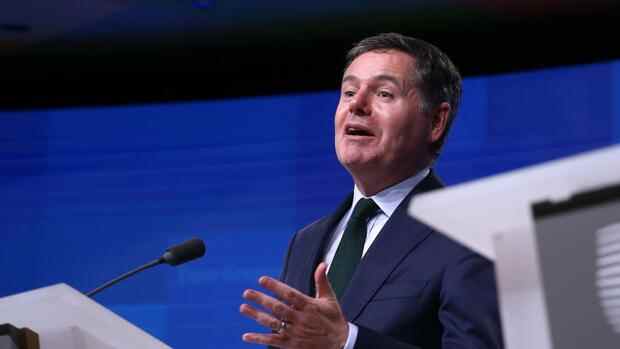Brussels Eurogroup boss Paschal Donohoe sees no signs of a recession in the euro zone. “There are enough growth drivers in our economy to achieve overall positive growth this year,” said the Irishman in an interview with the Handelsblatt and other European newspapers in Brussels. “That’s a very realistic view.”
Concerns about a recession had recently increased on the financial markets. On Tuesday, the euro fell to par with the US dollar for the first time in twenty years. Analysts cited the fact that the war in Ukraine was hitting the euro zone harder than the US as the reason. The fear of a new euro crisis has also returned, which is reflected in rising yields on southern European government bonds.
Donohoe emphasizes that the euro zone is ready for any challenge. “The euro zone is resilient enough to deal with any economic conditions that might arise,” he says.
Mr. Donohoe, the euro has fallen to par with the dollar, markets appear bearish. Are we facing a recession in the euro zone?
The Eurogroup has always indicated that there is a risk of slowdown, but overall I expect further growth this year. This is supported by the high employment rate, the impact of the Corona recovery fund and domestic demand. People are now spending their savings accumulated in the pandemic.
Top jobs of the day
Find the best jobs now and
be notified by email.
Are governments doing enough to prevent a downturn?
At our meeting on Monday, we decided to closely coordinate economic and fiscal policies. Second, I would point to the Recovery Fund, which will have an even greater impact in 2023. Finally, at EU level, we are doing everything we can to get energy risks under control. The Euro Zone is resilient enough to deal with any economic conditions that might arise.
The risk premiums on southern European government bonds have meanwhile risen sharply again. How can you stop this fragmentation?
The ECB will exercise its independent mandate and choose the monetary policy options it deems appropriate. And we have shown in recent years that the political will is there to keep the euro resilient. The markets are reacting to our monetary and fiscal policies. We’ve seen spreads shrinking again over the past few weeks.
Do highly indebted countries like Greece need to speed up their debt reduction?
We have emphasized that the countries with higher debts must take this fact into account in their economic policies – especially as we now fight against the effects of inflation. The Greek government is already doing this. It will present a primary budget surplus in the coming year. All my fellow ministers are making great efforts to find the right balance: they must protect their societies from inflation, while at the same time doing nothing that creates additional risks and could increase inflationary pressures further.
You seem pretty optimistic. Is this realistic? After all, the next wave of corona could come in winter, there is no gas for heating, and then there is this huge inflation.
There are enough growth drivers in our economy to achieve overall positive growth this year. That’s a very realistic view. But there are risks. If I were to deny these risks, it could be called unrealistic.
Germany and France warn against a Russian gas stop. Did you talk about this in the Eurogroup?
This has been seen for many months as a threat we must prepare for. The EU has set the goal of filling the gas storage tanks to 80 percent. We are currently at 55 percent and we are making further progress. In the second half of July, the Commission will also come up with a plan on how we could deal with a gas freeze, should it happen.
How is this uncertainty affecting the debate on Stability Pact reform?
We have had an atmosphere of uncertainty for a long time. Only the causes change. After the summer, the Commission intends to present a proposal for reforming the Stability Pact. We will then have an intensive but constructive debate.
Can you be more specific?
I am not going to say now what changes I think are possible, because we need to hear the opinions of all governments first. And there is a whole range of opinions, because the economic diversity is great. There are also different political views at the table because we are a democratic project. But we will reach an agreement.
Let’s move on to the reconstruction of Ukraine. The costs are estimated at up to one trillion euros. The EU will probably have to provide a large part of it. Where will the money come from?
During the war, the EU has already stepped in with significant resources to ensure a functioning government in Ukraine. After the war, which hopefully will end with the recognition of Ukraine’s sovereignty, we will rebuild the country. I am sure that the EU will play a leading role. But before that happens, we have to help with very large sums in the current situation.
Can the EU finance reconstruction without joint borrowing?
We will have many more bridges to cross before we get to this point. When the time comes, we will make the decision on the level of support and how that will come about.
French President Emmanuel Macron wants another European recovery fund for defense and climate protection. A good idea?
There are very different views on the future of the recovery fund. At the moment we all agree that the existing fund should be implemented first. This was a huge step forward for the EU.
The questions were asked by Carsten Volkery and correspondents from other European newspapers.
More: In times of weak demand, economies devalue their currencies to support economic activity. Things are different now – that endangers Germany’s business model.
